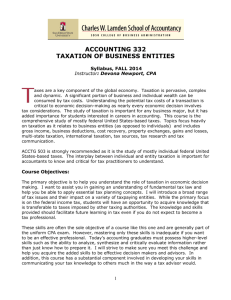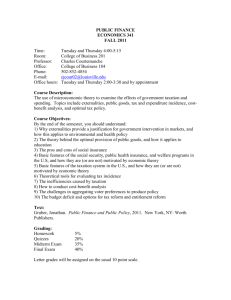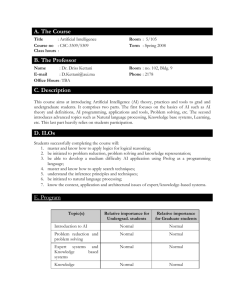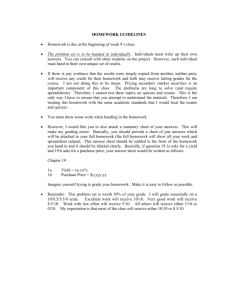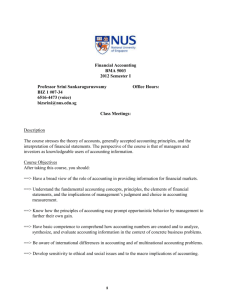ACCOUNTING 322-- INTEGRATED ACCOUNTING TOPICS II (Tax
advertisement
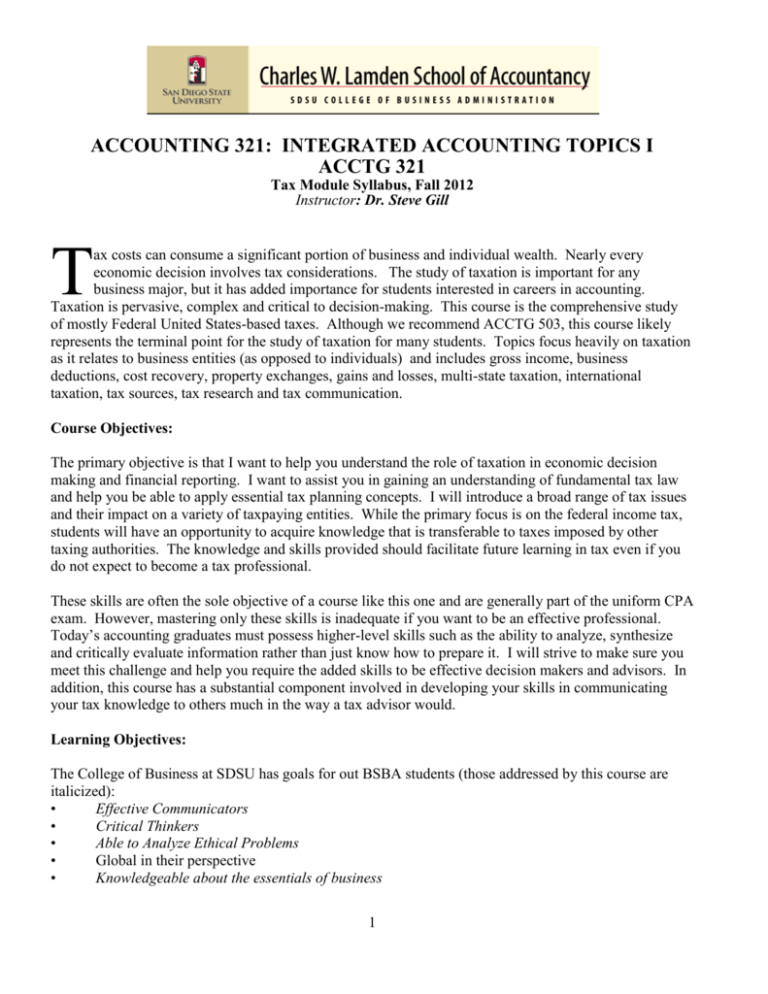
ACCOUNTING 321: INTEGRATED ACCOUNTING TOPICS I ACCTG 321 Tax Module Syllabus, Fall 2012 Instructor: Dr. Steve Gill T ax costs can consume a significant portion of business and individual wealth. Nearly every economic decision involves tax considerations. The study of taxation is important for any business major, but it has added importance for students interested in careers in accounting. Taxation is pervasive, complex and critical to decision-making. This course is the comprehensive study of mostly Federal United States-based taxes. Although we recommend ACCTG 503, this course likely represents the terminal point for the study of taxation for many students. Topics focus heavily on taxation as it relates to business entities (as opposed to individuals) and includes gross income, business deductions, cost recovery, property exchanges, gains and losses, multi-state taxation, international taxation, tax sources, tax research and tax communication. Course Objectives: The primary objective is that I want to help you understand the role of taxation in economic decision making and financial reporting. I want to assist you in gaining an understanding of fundamental tax law and help you be able to apply essential tax planning concepts. I will introduce a broad range of tax issues and their impact on a variety of taxpaying entities. While the primary focus is on the federal income tax, students will have an opportunity to acquire knowledge that is transferable to taxes imposed by other taxing authorities. The knowledge and skills provided should facilitate future learning in tax even if you do not expect to become a tax professional. These skills are often the sole objective of a course like this one and are generally part of the uniform CPA exam. However, mastering only these skills is inadequate if you want to be an effective professional. Today’s accounting graduates must possess higher-level skills such as the ability to analyze, synthesize and critically evaluate information rather than just know how to prepare it. I will strive to make sure you meet this challenge and help you require the added skills to be effective decision makers and advisors. In addition, this course has a substantial component involved in developing your skills in communicating your tax knowledge to others much in the way a tax advisor would. Learning Objectives: The College of Business at SDSU has goals for out BSBA students (those addressed by this course are italicized): • Effective Communicators • Critical Thinkers • Able to Analyze Ethical Problems • Global in their perspective • Knowledgeable about the essentials of business 1 The Charles W Lamden School of Accountancy (SOA) has learning objectives for each undergraduate accounting major. A complete list of these can be found on the SOA’s website. This course intends to address the following of those learning objectives: 1. Determine the income tax of taxable entities in order to assess the effects of personal, investment and business transactions on their tax and after-tax cash flows. 2. Prepare professional written reports for accounting related topics 3. Apply ethical rules, theories and regulatory guidelines to the practice of public, private and tax accounting; understand the need for professional integrity and objectivity. ACCTG 321 intends to provide students with the opportunity to meet each of the following course level learning objectives: 1. Comprehend the rationale for tax laws by differentiating the types of tax bases and weighing the multiple objectives tax policymakers consider when developing new tax law. 2. Apply analytical reasoning tools to assess how taxes affect economic decisions for business-related taxpaying entities: a. Through the amount and timing of income recognition and deductions b. Related to property transactions that generate recognized, deferred, or no taxable gains and losses c. Related to organization form decisions. 3. Develop a fundamental understanding of the components of taxable income determination across taxable entities so that the student builds a foundation for effectively learning future tax laws 4. Draw supportable conclusions regarding tax issues by using research skills (including accessing and interpreting sources of authoritative support) to identify and evaluate opportunities 5. Communicate tax conclusions in a clear and concise manner to relevant stakeholders. Meeting the Objectives: To help you in meeting these objectives, I have provided a wide array of education elements including: A textbook: Taxation of Individuals and Business Entities 2013 Edition (Spilker et al, published by McGraw Hill) with ample questions and practice exercises, problems and cases; A set of practice problems available in Gleim, Federal Tax Exam Questions and Explanations, 22nd Ed. Homework assignments based on the materials we covered in class and which will be assessed and returned to you; Thirteen two hour and forty minute class meetings during which we will do a variety of teaching and learning activities; A number of quizzes which will be assessed and returned; Two tax research/tax planning cases; Two midterm exams and a final exam; Office hours and a graduate assistant to be available to try and help you with any difficulties you may be having. Our Learning Community: Just like any other human relationship, successful relationships in the classroom require mutual respect and communication. I promise to do my part to foster the positive aspects of this learning community, and I expect the same in return from each student. My responsibilities: I will be prepared for every class. I will attempt to answer any questions that you have, if not immediately, then as soon as possible thereafter. I will try and create a classroom environment that feels safe – safe for you to ask questions without fear of embarrassment and safe for you to be yourself and focus on learning. I will do my best to be fair in my assessment of your performance and assignment of grades and to report these grades as quickly as possible. I will attempt to help you understand what you read in the textbook and also add value to the course by adding insights and information that is not in the text. I will try to continuously improve this class. Your responsibilities: I expect that you will come to class. Your presence in class benefits us all. I expect you to come to class prepared. That includes preparing each chapter prior to coming to class for that chapter. I expect you will plan your schedule appropriately to allow sufficient time outside of class to be successful in this course. I expect that you will ask questions of me and your colleagues when you do not understand something you read, something I said, or something one of your colleagues said in class. It is imperative that any confusion you might have be as temporary as possible. If you are uncomfortable asking in class, I expect you to contact me in my office. I expect you to come prepared to meetings during office hours. Try and write out the question or for possibly quicker responses, try and e-mail the question first. I expect your communications with me to be professional and your questions must avoid issues that are adequately addressed in class, e-mail or in Blackboard. I expect you to obtain access to e-mail and Blackboard and check both frequently. Academic Honesty: Accounting is a profession that depends on trust – individuals, companies and society as a whole place reliance on the decisions and opinions of accountants. For most of history, accountants were viewed among the most trusted members of society. In recent years, certain events have eroded this trust. Rebuilding this trust will take a long time but can be accomplished if future accountants ensure that such lapses do not recur. I take my role in this effort very seriously (and I expect you will as well). All assignments are individual assignments unless specifically instructed otherwise. As such, all homework should be your own work. If you are unsure as to what is safe to ask of another person, then ask me first; otherwise, assume it is NOT safe to ask anyone else. The SDSU Standards for Student Conduct (http://www.sa.sdsu.edu/srr/conduct1.html) states that unacceptable student behavior includes “cheating, plagiarism, or other forms of academic dishonesty that are intended to gain unfair academic advantage.” Any student suspected of academic dishonesty will be reported to the SDSU Center for Student Rights and Responsibilities; if found responsible for academic dishonesty, the student will receive an F in ACCTG 321. Plagiarism According to the SDSU Academic Senate policy on cheating and plagiarism: 2.2 Plagiarism shall be defined as the act of incorporating ideas, words, or specific substance of another, whether purchased, borrowed, or otherwise obtained, and submitting same to the 3 University as one’s own work to fulfill academic requirements without giving credit to the appropriate source. Plagiarism shall include but not be limited to (a) submitting work, either in part or in whole, completed by another; (b) omitting footnotes for ideas, statements, facts, or conclusions that belong to another; (c) omitting quotation marks when quoting directly from another, whether it be a paragraph, sentence, or part thereof; (d) close and lengthy paraphrasing of the writings of another; (e) submitting another person’s artistic works, such as musical compositions, photographs, paintings, drawings, or sculptures; and (f) submitting as one’s own work papers purchased from research companies. Because the course requires preparation of a number of written works, the temptation to plagiarize is stronger than in most accounting (or business) courses. When you put your (or your group members) name at the top of the assignment, the prevailing notion is that all the ideas, words, or specific substance are those of your own creation and not another unless it is made obvious to the reader that is not the case. As stated above, I reserve the right to assign a grade of F in ACCTG 321 if you plagiarize. To reduce the temptation, we will use Turnitin in Blackboard for written submissions. Course Logistics: Scheduled class times are: Section Days 1 MW 2 MW Times 13:00-15:40 19:00-21:40 Location SSE1401 GMCS301 Prerequisites: Admission to the Accounting major or minor at SDSU Course Material: Taxation of Individuals and Business Entities 2013 Edition (Spilker et al, published by McGraw Hill). Gleim Federal Tax Exam Questions and Explanations, 22nd Ed. You should bring the Spilker book to class. You will NOT need to bring the Gleim book to class. Bring your best attitude, a calculator and your table pack to class each session. We will use Connect as the online homework manager. Your Connect links: Section Link http://connect.mcgraw-hill.com/class/s_gill_section_02_at_1_pm 02 (1 pm) http://connect.mcgraw-hill.com/class/s_gill_section_03_at_7_pm 03 (7 pm) In addition, I will be assigning LearnSmart modules to help you prepare. LearnSmart Link: http://www.mhlearnsmart.com/einsteinmt/einstein.html?product=119464&pilot=1 Signup Code for Section 02 (1pm): PAQEN Signup Code for Section 03 (7pm): FANEC Assessment: Your primary assessment will be through exams, case studies, quizzes, and homework. Exams, quizzes, homework, cases, etc. will be given on the dates listed in the calendar below. Scheduled quizzes will be given at the beginning of each class period. This module has 1,000 points towards the class total of 2,000 and is allocated as follows: Assessment Midterm Exam I Midterm Exam II Final Exam CBK Exam Quizzes Cases Homework Total for module Total for course % of grade Points 15 180 18 200 20 200 10 100 9 90 13 130 10 100 100% 1,000 50% 2,000 Midterm and Final Exams: All exams will be cumulative for material presented up to that date. The midterm exams will be taken in your classroom at regularly scheduled times. The final exam is scheduled for Saturday, May 10th from 10:30am to 12:30. You MUST take your exam during the scheduled exam time. There are no provisions for missed exams other than those required under University policy. My exams are long and difficult and may often test not only your ability to master the material but also to efficiently communicate your knowledge back to me. Time management is an important element to success on my exams. Common Body of Knowledge Exam (the “CBK”): As part of your final exam, you will have twenty five multiple choice questions on the most important core material covered during the course. A score of 70% or better is required to earn any points on this exam. For example, if you correctly answer 71% of these questions, you will earn a 71%. If you correctly answer 69% of the questions you will receive a score of zero on this exam. These questions will be clearly identified as CBK questions on the final exam. Each midterm will have a CBK component so you can get accustomed to the type of questions; however, the midterms will not have a 70% or nothing grading scheme. Quizzes: Quizzes will be given promptly at the beginning of each class period for the material presented for that class period so you will need to come to YOUR SECTION prepared. The quizzes are intended to be a test of how thoroughly you have prepared (but not mastered) the material. Since they will be given at the start of class, arriving late will result in a quiz grade of zero for that quiz. No exceptions. It is my intention to have 11 quizzes and drop the lowest two quiz scores. Cases: There will be two tax cases. The cases may focus on: (1) successfully researching a tax issue using SDSU’s online tax research system (RIA Checkpoint); (2) completing tax return or related information in good form; (3) successfully analyzing the present value of after tax cash flows; (4) some combination of the above or (5) some other topic. The cases will be prepared during time outside of class. Typically, 5 your case solutions will be collected in class or using TurnitIn in Blackboard. Cases are typically graded by my graduate assistants on a rotating basis. Homework: Homework assignments are largely prepared using McGraw Hill’s Connect product associated with your textbook and most are due at 11:00pm on the Saturday after the work has been discussed in class. In some instances, the due date is accelerated to allow for more exam preparation time with the solutions. In some instances, homework may also be due in written or typed format and therefore due at the start of class. You should first attempt to complete the homework individually. If you are unable to understand a question, I encourage you to consult with a classmate. The homework solutions become available immediately after the due date. All homework that is 70% or more correct will receive FULL credit. Homework between 50 and 70% correct will receive partial credit (typically half or more). Homework less than 50% will receive 0 credit. By design the homework is intended to graded leniently. Late homework will not be accepted. I will drop your lowest homework grade. Attendance: I do not take attendance. Each class meeting is 2 hours and 40 minutes and thus missing just one class is the same as missing a week in a typical class. If you are unable to attend class, do not expect that I will make up that lecture for you individually in office hours. You may not make up a quiz. Course Calendar: The course calendar is posted separately in Blackboard. It is a plan for using the available class time we have this semester. It is my best estimate of how the semester will progress, but from time to time, I may revise it as necessary. About me: Instructors Steve Gill Instructor: Office Email: Office phone: Office mailbox: Office SS3435 e-mail sgill@mail.sdsu.edu Office phone 594-6273 (you should only call my office in case of an emergency otherwise, email or come to office hours) Office Hours T 10:00am - 11:00am TH 2:00pm – 4:00pm F 2:00 – 3:00pm (location TBA) Steve Gill, Ph.D., CPA (MA inactive), Assistant Professor SS3435 (3rd Floor/Green Patio) sgill@mail.sdsu.edu (619) 594-6273 Located near entrance to School of Accountancy offices on 2nd floor of SS. Quick Bio of Prof Gill: Education: University of Florida, B.S. Accounting 1989; Northeastern University, M.S.T. 1996 University of Massachusetts, Ph.D, February 2008 Work experience: PricewaterhouseCoopers – Audit, Miami, Fl 1990-1992 Ryder Systems, Inc – Internal Audit, Miami, Fl 1993 ThermoElectron, Inc – Internal Audit, Waltham, MA 1993-1994 Eastern Enterprises, Inc – Corporate Accounting, Weston, MA 1994-1996 PricewaterhouseCoopers – Tax Manager, Boston, MA 1996-1998 Digitas, Inc – VP Finance and Tax Director, Boston, MA 1998-2002 7

